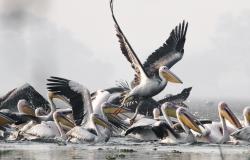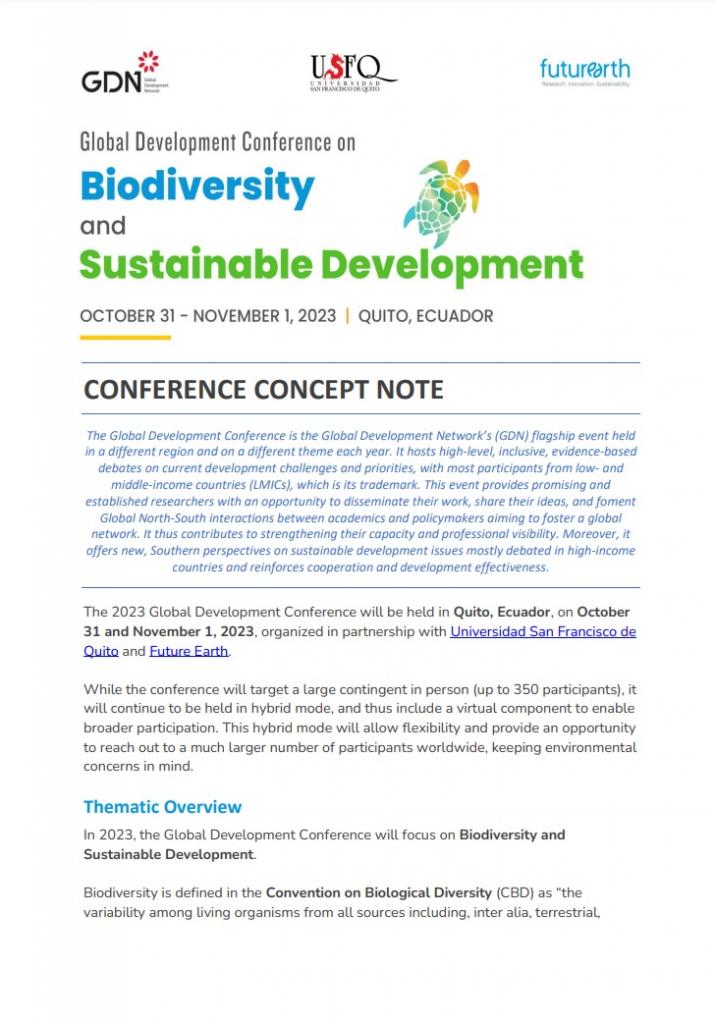Navigating the Unprecedented Biodiversity Crisis: A Call to Action

Pablo J. Varela introduces the Global Development Network's upcoming 2023 conference on 'Biodiversity and Sustainable Development' (31st October - 1st November).
The unfolding biodiversity crisis casts a formidable shadow over our health, development, and overall prosperity. Recently, the Global Biodiversity Framework (GBF), established during COP15 in Montreal, serves as a vivid reminder of the declining state of nature's contributions to human societies. Driven by factors such as land and sea use changes, pollution, overexploitation, climate change, and invasive species, this crisis permeates fundamental aspects of our world. The implications are far-reaching, from the jeopardy faced by countless species to the erosion of global food security and sustainable development. Although efforts like the Aichi Biodiversity Targets were undertaken, their inadequacy in curbing these distressing trends is evident. The Global Assessment Report on Biodiversity and Ecosystem Services by the Intergovernmental Science-Policy Platform on Biodiversity and Ecosystem Services (IPBES) unequivocally underscores the imperative of transformative change to realize essential societal and environmental goals, including biodiversity preservation and sustainability.
The role of robust scientific research as the bedrock of effective global policies is universally acknowledged. From addressing global challenges to realizing the Sustainable Development Goals and navigating the intricacies of the Global Biodiversity Framework, diverse insights from various fields and knowledge sources stand as linchpins. Yet, the difference in research capabilities and policy influence between the Global North and South is undeniable. This accentuates the call to bridge this divide by amplifying voices that have often been marginalized, cultivating equitable collaborations, and blending local knowledge into solutions.
 Multidisciplinary perspectives and collaboration are key
Multidisciplinary perspectives and collaboration are key
Undeniably, recent IPBES assessments resonate with the potential of ecological understanding to incite concrete policy shifts. These assessments underscore the influence of scientific understanding in navigating the complexities of our sustainability landscape. However, this landscape extends far beyond ecological considerations; it interweaves with social, economic, and cultural dimensions. To grasp the holistic panorama, an integration of natural and social sciences perspectives is essential. Indigenous and local communities, along with diverse knowledge systems, offer invaluable insights that can guide the formulation of solutions tailored to specific contexts. This approach aligns with frameworks like the 2030 Agenda for Sustainable Development and its 17 Sustainable Development Goals (SDGs), demonstrating that inclusivity and contextual understanding are pivotal. Steering ahead, the significance of investing in research and sharing knowledge becomes crystal clear. This investment holds the key to transforming ecological insights into policies that are both environmentally conscious and equitable for all.
Global Research disparities and collaborative potential
Disparities in research capacities persist globally, manifesting in varying levels of research productivity across different regions. Institutions in Europe and North America often lead sustainability research, significantly contributing to the worldwide discourse (Institute for Scientific Information, 2019). However, this reality does not overshadow the potential insights emerging from other parts of the world. Collaborative endeavors to democratize access to scientific discoveries are required to enhance research systems and cultivate expertise in regions currently lagging behind.
Fostering intellectual capital within lower-income nations demands sustainable financial support for universities and research hubs. Augmenting local research capabilities isn't solely about enriching global conversations; it's also about providing crucial, context-specific guidance for national decision-makers. However, a significant challenge in this pursuit is the unequal distribution of research funding, particularly in the realm of social sciences and topics like biodiversity. Resources tend to be concentrated in institutions from higher-income nations, which can define research priorities, limiting the ability of researchers from the Global South to contribute substantively to vital conversations (ISC, 2023).
The importance of international collaborations shines brightly. Encouraging partnerships led by scholars from the Global South infuse a unique essence into the global research panorama. Such alliances, empowering Southern experts to mold research agendas and play pivotal roles in collaborative ventures, can contribute to capacity growth while enriching dialogues with diverse viewpoints. Ultimately, this inclusivity becomes an essential ingredient for well-informed policymaking that resonates with the multifaceted needs of our interconnected world. Equally vital are equitable research partnerships led by Southern counterparts, providing a foundation for capacity enhancement and policymaking that genuinely reflects Southern perspectives.
Global Development Conference 2023: A catalyst to amplify Southern voices
Embedded at the heart of this conference is an unwavering commitment to cast a spotlight on the often-overlooked voices emerging from the Global South. This gathering offers Southern researchers a vital platform to showcase their impactful multidisciplinary endeavors. As diverse disciplines seamlessly intertwine to confront different facets of sustainability challenges, these researchers present insights rooted in diverse contexts and enriched by hands-on experiences.
The conference's thematic streams transcend their role as mere presentation platforms; they emerge as dynamic arenas for profound cross-border conversations. Themes traverse diverse territories, encompassing ecosystem valuation methodologies, nature-based solutions, and the complex realm of gender inequalities. Within these discussions lies the potential to form the bedrock for well-informed policymaking.
Yet, the true essence and strength of the conference resides in its capacity to foster North-South collaborations that foster the co-creation of knowledge. However, these collaborations are not limited to mere intellectual fusion. They are designed to actively challenge and recalibrate existing power dynamics, paving the way for authentic Southern leadership. The conference aims to transcend a mere assembly of ideas and allow the Southern perspective to command the stage with the perspectives of those on the frontline of sustainability's complexities.
Pablo Varela is a purpose-driven consultant and program manager working at the intersection of business, technology, and international development. With a Master's degree in Development Studies from the Institute of Development Studies at the University of Sussex, he has over a decade of experience spearheading sustainability initiatives, research programs, and partnerships focused on the Sustainable Development Goals. Pablo has enabled companies, non-profits, and UN agencies in regions like Latin America, Europe, and Asia to create positive social change. He is accomplished in consensus-building, communicating complex issues, and adapting tools and strategies to make global programs locally relevant. Having led project teams dealing with biodiversity mainstreaming, climate action, inequality, and innovation, Pablo brings an entrepreneurial spirit and systems-thinking lens to addressing multi-dimensional development challenges.
Photo by vishnudeep dixit


